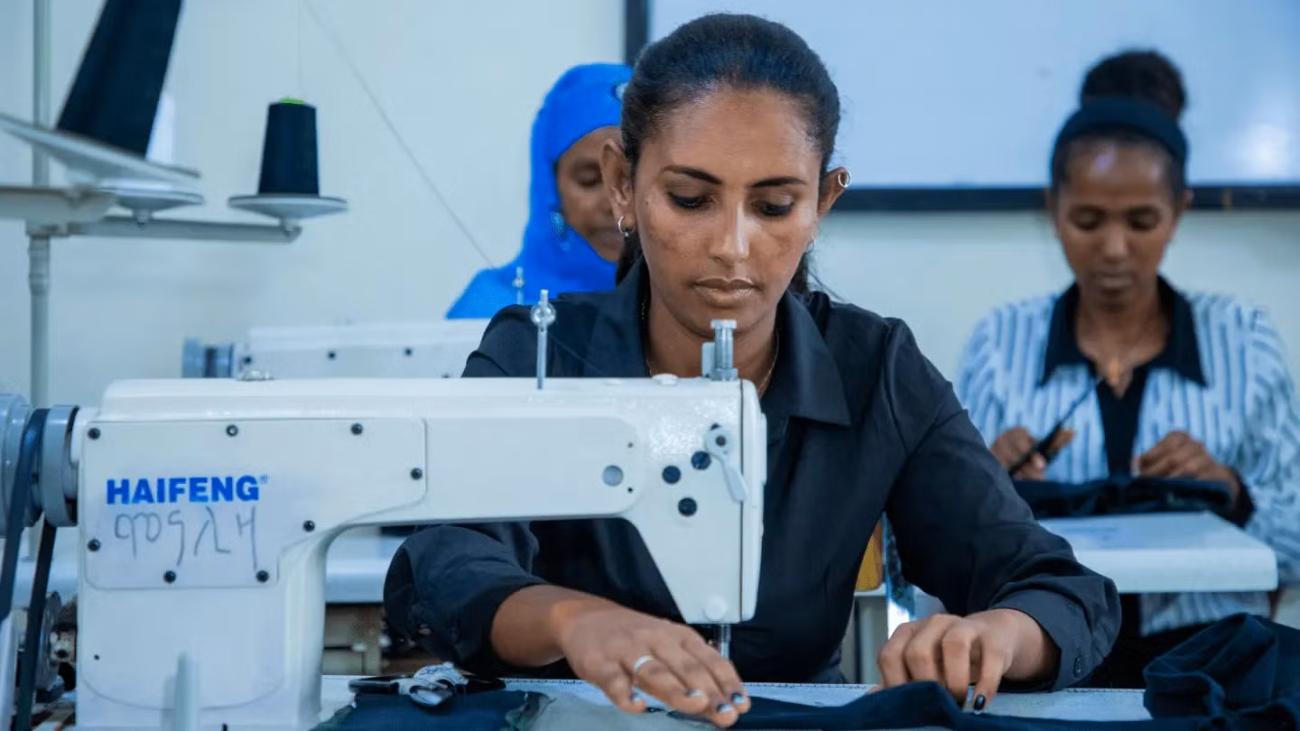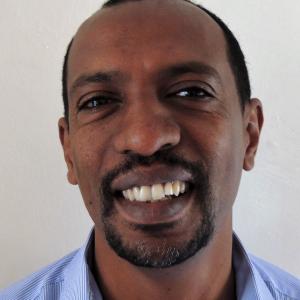In a sunlit room at the Mum for Mums compound in Mekelle, Mebrihit Hayelom examines a pair of freshly sewn absorbent sanitary shorts, each stitch a testament to survival, resilience, and the promise of a better future. Just a few months ago, producing hygienic menstrual products for her community seemed unimaginable. Today, it represents hope, not just for her, but for countless women and girls in Ethiopia’s conflict-affected Tigray region.
At 32, Mebrihit is a single mother, a survivor of war, and now an aspiring entrepreneur. Her story is shaped by loss, struggle, and a determination to rebuild her life. Thanks to a groundbreaking initiative by UNFPA Ethiopia, with the generous support of the Government of Japan in partnership with ITOCHU Corporation, Mebrihit is turning hardship into opportunity, empowering herself and her community.
A Life Upended by Conflict
Before the conflict in Tigray, Mebrihit lived a modest but stable life. She had a home, a small income, and access to necessities, including sanitary products. But when conflict reached Tigray, everything changed.
“We lost our security, our livelihoods, and our dignity,” she recalls, her voice steady but her eyes reflecting deep pain. “Women bore the heaviest burdens. Even the most basic need, managing menstruation, turned into a daily ordeal fraught with shame and discomfort.”
Markets were destroyed, and supply chains were disrupted. Sanitary pads became a luxury many could no longer afford. Mebrihit and other women resorted to using old pieces of cloth, a solution that was uncomfortable, unhygienic, and often humiliating. The psychological toll was immense.
“We helped each other when we could, but the shame and stress were unbearable,” she says. “No woman should have to go through that.”
A New Beginning Through the Japan-funded TICAD Project
In February 2025, UNFPA Ethiopia launched the Japan-funded TICAD (Tokyo International Conference on African Development) project to empower women and girls in conflict-affected areas of Amhara and Tigray. The initiative offered more than skills, it provided a lifeline.
When Mebrihit heard about the training to produce absorbent sanitary shorts, she did not hesitate. “I wanted to learn, to stand on my own feet again, and to help other women,” she says.
The project upgraded the Mum for Mums training center in Mekelle, equipping it with sewing machines, materials for producing absorbent sanitary shorts, and expert trainers supported by UNFPA in partnership with ITOCHU Corporation. Over four weeks, Mebrihit and her peers learned how to manufacture high-quality, absorbent sanitary shorts, an affordable, sustainable alternative to disposable pads.
But the training went beyond production. Participants also received education on sexual and reproductive health, gender-based violence prevention, and financial literacy through Village Savings and Loan Associations. For Mebrihit, this holistic approach was transformative.
“I didn’t just learn how to sew,” she explains. “I learned about my health, my rights, and how to manage a business. For the first time in years, I felt in control of my future.”
From Trainee to Entrepreneur
Today, Mebrihit is conducting market research, connecting with potential customers, and planning her small business. The project provides start-up packages to graduates, ensuring they have the tools to launch their enterprises immediately.
“Next year, I want to build a sustainable business,” she says with quiet determination. “Not just for myself, but to make sure no woman in my community has to suffer like we did. I want my business to be about more than profit. I want it to be about dignity, health, and hope for every woman here.”
Her vision extends beyond income. She dreams of a Tigray where menstrual hygiene is no longer a barrier to education, work, or dignity. Where women support each other, not just in survival, but in thriving.
A Model of Innovation and Partnership
Mebrihit’s story shows the power of collaboration. By combining UNFPA’s expertise in sexual and reproductive health and empowerment with private-sector innovation, the TICAD project addresses immediate needs while building long-term economic resilience.
The project’s success will be showcased at the Tokyo International Conference on African Development (TICAD) 9 in August 2025, where leaders from Africa and beyond will gather under the theme: “Co-create innovative solutions with Africa.” Mebrihit’s journey embodies this spirit, proving that when communities, governments, and businesses work together, even the most vulnerable can reclaim their futures.
Looking Ahead
As Mebrihit prepares to graduate from the program, she reflects on how far she has come. The trauma of war still lingers, but it no longer defines her. With every stitch, every sale, every step, she is building a future filled with hope.
“This project gave me hope. And now, I want to pass that hope on to others” she says.
In a region still healing from conflict, stories like Mebrihit’s are beacons of resilience. They remind us that even in the darkest times, innovation, partnership, and the strength of women can light the way forward.






